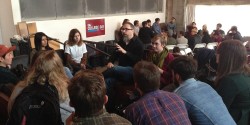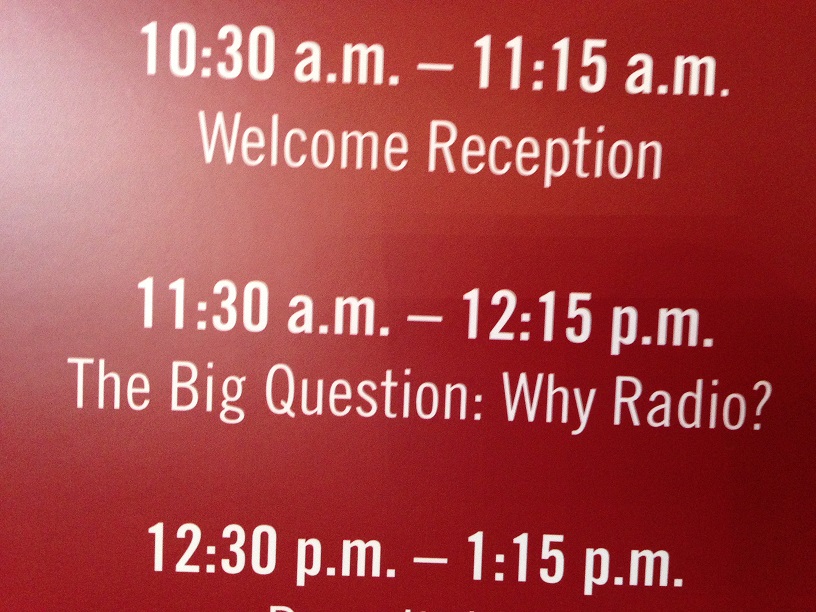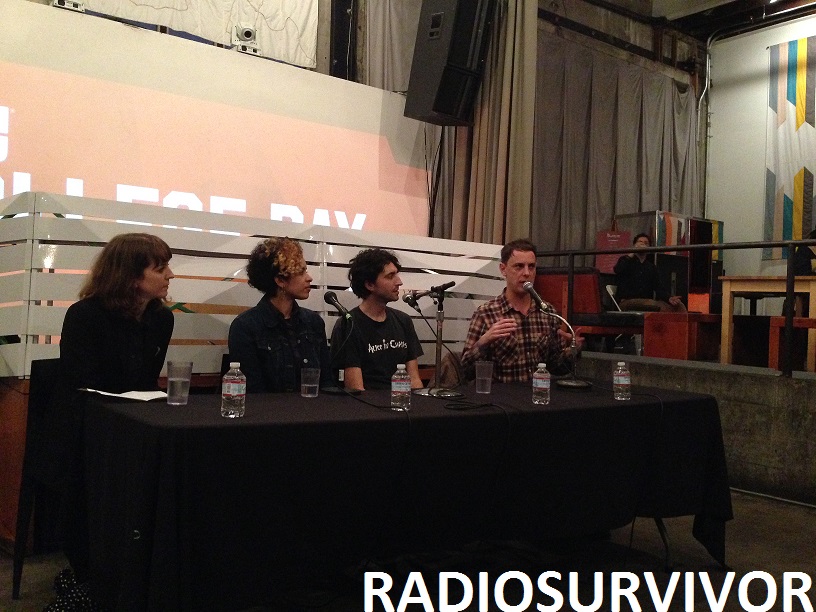On Saturday, November 7, Paul Riismandel and I represented Radio Survivor at CMJ’s first College Day on Tour. The all-day event took place at the club Holoscene in Portland, Oregon and featured panel discussions, roundtable chats, as well as live music performances at lunch and at the end of the day by several Portland bands, including Jackson Boone & the Ocean Ghosts, Sabonis, and Ghost Ease. Sort of like a micro version of CMJ’s annual College Day during its Music Marathon in New York City, this event really worked to bring together college radio participants from the local region. With Portland-based streaming college radio stations KDUP (from University of Portland) and KPSU (from Portland State University) partnering with CMJ to help curate the day, the event definitely took advantage of its Portland locale.
Additionally, panels drew from nearby regions, with both college radio participants and music industry representatives mostly hailing from Oregon and Washington. Overall, the event attracted 120 folks, including participants from 16 different radio stations (mainly from Oregon and Washington, but there was also one station from Canada and one from California).
Why Radio? Panel Argues that Radio is FAR from Dead
The day started off with “The Big Question: Why Radio?” panel. Participants included KDUP General Manager Jack Greenwood, KAOS (Evergreen State University) Music Director Anna Gordon, KCWU (Central Washington University) Program Director Nikki Marra and yours truly. We all started off by giving our perspectives on why radio still matters in 2015 and I was pleased to hear Greenwood talk about the “sheer diversity of music” that can be heard on the radio, which he contrasted with services like Spotify, which tend to expose listeners to music that they are already aware of.
Marra added that she likes the “immediacy” of radio and also rhapsodized about radio as the “theater of the mind.” All of us also shared some of our favorite radio moments, which typically revolved around listeners recognizing what we were doing on air and expressing that to us. And, finally, we were all asked to give our “elevator pitch” for radio, when asked if “radio is dead?” This was pretty easy for all of us radio fanatics to do and I particularly enjoyed Marra’s reminder about the importance of terrestrial radio during a disaster. She said, “Radio is not dying…it’s actually saving lives.” Gordon added that radio is “expanding across the airwaves” and explained that with multimedia and social media, radio’s influence is growing, particularly through video, as is the case with live sessions on stations like KEXP in Seattle.
Other panelists echoed my feeling that college radio participation is growing. Greenwood said that KDUP is now the most popular organization at University of Portland, with over 80 DJs. Recently the station got sent a list of more than 100 prospective students who are interested in the college radio station.
Roundtable Discussions Delve into the Nitty Gritty of College Radio
Following the opening panel, attendees had the opportunity to join in on a number of different roundtable discussions, including one led by Paul Riismandel on “Running a Station.” Students shared tips on how to successfully manage a station. Some of the ideas raised included having regular meetings to discuss DJ airchecks, hosting music listening parties, and focusing more on “positive encouragement” in order to motivate DJs. Other roundtables focused on “Music Directors & The Radio Industry,” “Community Voice & Listener Engagement,” and “Music Licensing & Artist Development.”
Building Connections with the Community and with the Music Industry
Throughout the day, participants were able to sign up for one-on-one mentor sessions with a number of different music industry experts, including a few founders of music promotions companies, an expert in digital music and licensing, a music journalist, and a talent buyer/show booker. Additionally, several panels spoke to college radio’s relationship with the music industry, particularly the “I Work with a Pacific Northwest Label, Ask Me Anything” panel, which included speakers from K Records, Kill Rock Stars, Good Cheer Records, and Cabin Games.
The Thermals Reveal Their Love for College Radio
The formal panels concluded with a keynote conversation with Portland-based band The Thermals. Two of the members (Kathy Foster and Hutch Harris) grew up in the San Francisco Bay Area and shared that college radio stations in the area influenced them in their youth. Foster said, “Hutch and I listened to KFJC a lot” and mentioned that they were so thankful to have access to college radio. Although she never was a college radio DJ herself, Foster now co-hosts a show on Portland community radio station XRAY.fm with Maggie Vail. She mentioned that when she does her show, “I have those stations in my mind,” adding, “I just want there to be weird music on at 2am” like there is on college radio. Vail, who moderated the Thermals discussion, said that she actually did do college radio, but was kicked off the station when she wouldn’t play required “rotation” music.
Making Radio Connections
To me, the most exciting thing about the event was seeing people connecting with their counterparts from other radio stations. I experienced this myself and really enjoyed seeing folks who I had met previously at KAOS, KDUP, and KCWU. I also enjoyed meeting people for the first time from many other stations, including KBOO, KWVA, and others.
CMJ’s David DeKeyser, General Manager of CMJ’s College Radio Network, concurred, telling me,
There was something really wonderful about seeing people get to know and befriend each other as the day went on. Like there was a commonality among them they really meant all the groups were hanging out with each other. I’ve been to radio conferences where stations will only keep to themselves, but it felt like the programming and speakers elicited something from everyone and they were reaching out to everyone in the crowd. I was talking with some of the KDUP staff the day before about how they had so long been hoping to meet up with and talk to KPSU, but couldn’t, for a number of real reasons, mostly that all of them are full time students who are also trying to run radio stations, and how they were so excited now to be co-hosts of the event. And then there they both were, chatting with each other, seemingly making plans and trading notes. It’s something I love about our events, and making the day so focused on the area and the area’s concerns meant the community was that much stronger. I couldn’t have been happier with how that turned out.”
DeKeyser told me that as he looks ahead to future events, he’s optimistic about the outcome, saying,
I’m excited for this to grow. This was the start of something for us, both for the radio team at CMJ, and CMJ as a whole. We don’t want people to think of us as just Music Marathon or just radio charts. We’re both of those things and more. There’s a wider idea and philosophy beyond what CMJ has done in the past to give back to our stations, the industry, and the public at large, and I hope Saturday showed that we want to find new ways of exploring those ideas and finding new ones.”





